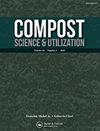Effects of Long-Term Use of Compost on N2O and CO2 Fluxes in Greenhouse Vegetable Systems
IF 0.9
4区 农林科学
Q3 ECOLOGY
引用次数: 13
Abstract
ABSTRACT This study was based on a long-term field trial of three different greenhouse vegetable growing systems which were started in March 2002. Fertilizer nitrogen and organic carbon inputs in three treatments in the spring of 2015 were as follows: (1) conventional system (CON): cow manure and dry chicken manure composts (about 146 kg N ha−1 and 1483 kg C ha−1) and urea (about 525 kg N ha−1); (2) low-input system (LOW): cow manure and dry chicken manure composts (about 325 kg N ha−1 and 3160 kg C ha−1) and urea (about 263 kg N ha−1); and (3) organic system (ORG): cow manure and dry chicken manure composts (about 651 kg N ha−1 and 5456 kg C ha−1). N2O and CO2 fluxes were monitored in the growing season of 2015 (from March to August) using static chamber and gas chromatography techniques. Results showed that: (1) The N2O and CO2 fluxes in three treatments all reached their peaks within 4 days and 8 days after irrigation, respectively. N2O emissions were positively correlated with soil temperature, soil water-filled pore space (WFPS), and NO3−-N contents, while strong association between CO2 emissions and soil temperature was observed. (2) Lower cumulative N2O emission and direct emission factor (p < 0.05) were observed in ORG than that from LOW and CON. (3) No significant differences of cumulative CO2 emissions were observed in three treatments, but CO2 emissions proportion of fertilizer carbon inputs and soil organic carbon stock in ORG was significantly lower (p < 0.05).长期使用堆肥对温室蔬菜系统N2O和CO2通量的影响
本研究是基于2002年3月开始的三种不同温室蔬菜种植系统的长期田间试验。2015年春季3个处理的肥料氮和有机碳投入量为:(1)常规系统:牛粪和干鸡粪堆肥(N ha - 1约146 kg, C ha - 1约1483 kg)和尿素(N ha - 1约525 kg);(2)低投入系统(LOW):牛粪和干鸡粪堆肥(约325 kg N ha - 1和3160 kg C ha - 1)和尿素(约263 kg N ha - 1);(3)有机系统(ORG):牛粪和干鸡粪堆肥(约651 kg N ha - 1和5456 kg C ha - 1)。在2015年3 - 8月的生长季节,采用静态室和气相色谱技术对N2O和CO2通量进行了监测。结果表明:(1)3个处理的N2O和CO2通量均在灌后4 d和8 d达到峰值。N2O排放量与土壤温度、土壤充水孔隙空间(WFPS)和NO3−-N含量呈正相关,CO2排放量与土壤温度呈显著正相关。(2) ORG处理的累积N2O排放量和直接排放因子低于LOW处理和con处理(p < 0.05)。(3)3个处理的累积CO2排放量差异不显著,但ORG处理的肥料碳输入和土壤有机碳储量的CO2排放比例显著低于LOW处理(p < 0.05)。
本文章由计算机程序翻译,如有差异,请以英文原文为准。
求助全文
约1分钟内获得全文
求助全文
来源期刊

Compost Science & Utilization
农林科学-生态学
CiteScore
4.10
自引率
0.00%
发文量
0
审稿时长
>36 weeks
期刊介绍:
4 issues per year
Compost Science & Utilization is currently abstracted/indexed in: CABI Agriculture & Environment Abstracts, CSA Biotechnology and Environmental Engineering Abstracts, EBSCOhost Abstracts, Elsevier Compendex and GEOBASE Abstracts, PubMed, ProQuest Science Abstracts, and Thomson Reuters Biological Abstracts and Science Citation Index
 求助内容:
求助内容: 应助结果提醒方式:
应助结果提醒方式:


